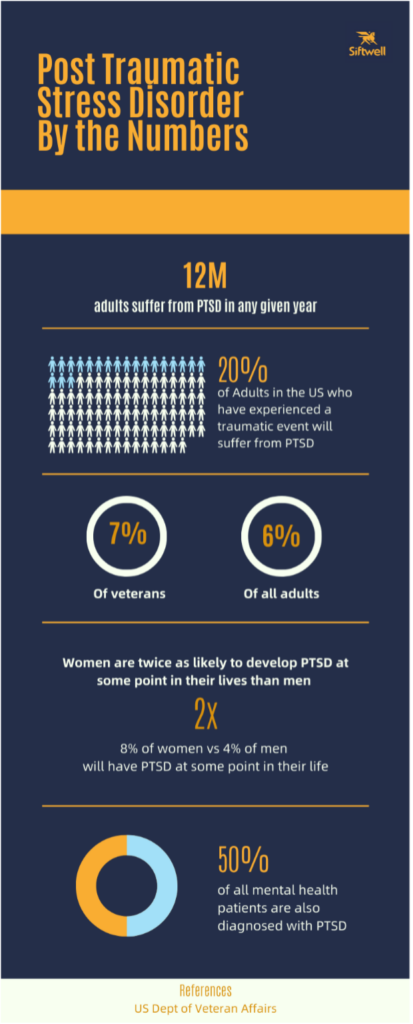Abstract
Post Traumatic Stress Disorder (PTSD) is an issue close to home for millions of people around the world. This psychological condition causes significant mental and physical distress for those affected, it can disrupt daily life, and cause negative ripples through families and communities. Unfortunately, even in today’s world there is still a negative stigma surrounding mental health disorders like PTSD that prevents countless patients from reaching out for the help and counseling they truly deserve. At Siftwell, we are actively developing cutting-edge methods that show the underlying factors contributing to impactful and persistent health conditions and help health plans and other stakeholders both understand and address untreated physical and mental health conditions, such as PTSD.
The PTSD awareness effort was born out of the heartbreaking loss of SSgt. Biel’s, a North Dakota National Guard member who took his own life after serving two tours in Iraq. In honor of his memory and the countless other veterans who have faced similar struggles, the entire month of June is dedicated to bringing awareness to PTSD and acknowledging the deep impact it has on people’s lives. Illuminating the impact, causes, and ways forward in PTSD helps to eliminate the stigma associated with this serious disorder and encourage those afflicted to seek treatment without the fear of the label. When left untreated, PTSD can wreak havoc on both the patient and their loved ones, leading to a range of negative outcomes.
Understanding the Impact of Post-Traumatic Stress Disorder
PTSD can affect anyone who has experienced or witnessed a traumatic event, like veterans, survivors of violent crimes, or individuals who have gone through catastrophic incidents. According to Xiafei Wang, Assistant Professor of Social Work, Syracuse University, an incident that exhausts someone’s psychological resources to cope with it or any event that deprives a person’s sense of safety, autonomy and dignity would be defined as trauma.
Trauma disrupts one’s view of themselves, others, and the world in profound ways. It can stem from a wide range of experiences, including sexual assault, war, abandonment, neglect, or loss of safety. Children who experience maltreatment, as well as racial, and ethnic minorities who experience discrimination are more likely to experience PTSD than dominant groups, as systemic racism can chronically influence their well-being and mental health.
PTSD is a complex disorder, and its symptoms can manifest in various ways, impacting individuals differently. In the United States alone, around 20% of adults who have gone through trauma suffer from PTSD. It’s estimated that approximately 7% of veterans and 6% of all adults will experience PTSD at some point in their lives. That adds up to a staggering 12 million adults grappling with this condition every single year. Women are more susceptible to developing PTSD compared to men, in part due to the nature of traumatic events they often face, such as sexual assault that can leave lasting emotional scars. Some may find themselves able to function relatively well despite the disorder, while others may experience significant debilitation. Common symptoms include intrusive thoughts, flashbacks, nightmares, persistent memories of the traumatic event, hyper vigilance, and even suicidal thoughts. The toll of this condition on the body is immense, as it subjects individuals to chronic stress, leading to physical symptoms like headaches, migraines, stomach issues, insomnia, and restlessness. If left untreated, PTSD can persist for years, casting a long shadow over an individual’s life.

Breaking the Stigma: Why Seeking Treatment for PTSD Matters
PTSD treatment requires some form of intervention or therapy, but the unfortunate reality is that not everyone has easy access to affordable mental health care. This can create barriers to getting the help they need but fortunately, there are many options available for individuals seeking support. Virtual support groups can provide free or low-cost resources, offering a community of understanding and guidance. Additionally, Medicaid or Medicare plans may cover mental health services, and some private health insurance plans recognize the importance of counseling for grief, trauma, or PTSD, considering it an essential health benefit and offering coverage. For veterans suffering with PTSD, the Veterans Affairs (VA) provides and covers PTSD health services ensuring they receive the care they deserve. The Veterans Crisis Line also stands ready to provide immediate support to those in crisis, ensuring that no veteran is left to face their struggles alone.
Efforts to educate both those suffering with PTSD and their communities along with promoting affordable and accessible mental health care can dramatically reduce the number of patients living with this condition. By addressing mental health needs and breaking down the stigma proactively, we can pave the way for improved overall health outcomes, foster resilience, and alleviate the burdensome healthcare costs associated with untreated psychological conditions. Some exciting efforts are being made today within the mental health professional and research communities:
New Findings for Treatment of Combat-Related PTSD:
- A recent study exploring a new therapy for combat-related PTSD has shown some really promising results for veterans struggling with this disorder. The study involved over 200 military personnel and veterans who underwent a unique treatment called compressed prolonged exposure (PE) outpatient therapy.
New Funding for PTSD Research:
- Following a recent successful Phase III clinical trial augmenting MDMA in PTSD psychotherapy, two Yale scientists working in the Department of Psychiatry were awarded a $1M grant to study the effects of the drugs MDMA and methylone as possible treatments for veterans with PTSD.
Nasal Drops as Potential PTSD Prevention:
- Recent studies have revealed the involvement of a small protein called neuropeptide Y in the development of PTSD. Innovative researchers are taking it a step further by exploring the use of nasal drops containing this very protein to prevent the onset of PTSD in an animal model.
Transforming Healthcare Through Actionable Predictive Analytics
At Siftwell, our dedication to making a difference in the fight is unwavering. We are actively developing cutting-edge methods that show the underlying factors contributing to impactful and persistent health conditions and help health plans and other stakeholders both understand and specifically address untreated physical and mental health conditions, such as PTSD. Action – on the individual human level – is how we measure success in our work with health plan partners. Together, we are forging a path towards improved healthcare outcomes and better outcomes for patients everywhere.
PTSD is a pervasive and potentially serious condition that has a profound impact on countless individuals. By fostering awareness and dismantling the stigma associated with PTSD, we can empower those affected to seek assistance without fear of social judgment. Timely intervention and appropriate treatment play a crucial role in minimizing the enduring effects of PTSD. As a society, it is imperative that we strive to offer accessible and affordable mental health care alternatives to ensure adequate support for those in need. We must continue and support the efforts underway to spread awareness, empathy, and resources for individuals fighting PTSD and other mental health disorders.


